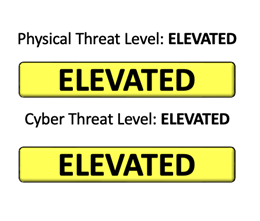The DAP highlights In response to Annunciation Church shooting, State Senate working group on gun violence prevention for the first time, Kash Patel to face grilling over Charlie Kirk investigation and his tenure as FBI director, Tropical threat building in Atlantic: Multiple areas may develop starting this week, and Enhancing K-12 Behavioral Threat Assessment and Management Practices: Proactive Approaches to School Safety. The DAP also has More Faith-Based Stories and Select All-Hazard Stories. These updates are shared to help raise the situational awareness of Faith-Based organizations to best defend against and mitigate the impacts from all-hazards threats including physical security, cybersecurity, and natural disasters.

Faith-Based Daily Awareness Post 23 July 2025
- FBISAO
- cybersecurity, faith, General, Headlines, News, preparedness, Resilience, resiliency, Resources, security, threat assessment
Faith-Based Security Headlines
These updates are shared to help raise the situational awareness of Faith-Based organizations to best defend against and mitigate the impacts from all-hazards threats including physical security, cybersecurity, and natural disasters.
Task Force Chairman McCaul Delivers Opening Statement In Hearing To Examine Historical Attacks At Mass-Gathering Events
Chairman Michael McCaul, leading the newly formed bipartisan Task Force on Enhancing Security for Special Events in the United States, delivering the opening statement at the hearing entitled “Lessons Learned: An Examination of Major Security Incidents at Mass Gathering Events”. Rep. McCaul emphasized that historical attacks have demonstrated how terrorists can target mass congregations to stage high-impact attacks that attract global attention. McCaul emphasized that impending international events the U.S. will host like the FIFA World Cup and the 2028 Summer Olympics are big mass gathering events that can be seen to “make statements of terror”. Rep. McCaul expressed a commitment to ensuring the Department of Homeland Security effectively coordinates with state and local law enforcement, emergency managers, and private-sector partners.
Analyst Comments: Rep. McCaul emphasizes that federal, state, and local agencies are ramping up in collaboration and threat intelligence and sharing is an added layer security for mass-gathering events. Individuals that may be attending mass gatherings may consider being prepared to attend; knowing where exits are located, identifying potential cover, and reporting suspicious behavior immediately. In preparation for upcoming major international events, FBOs are encouraged to review when events may be happening in your area of operations, and consider any additional risk of protest activity, or targeted violence that may be associated with such events, and adjust threat assessments accordingly.
With Less Federal Support, States Look to Lead in Cyber
As federal cybersecurity support decreases, both critical infrastructure operators and state and local governments are being thrown into a tough position. Cybersecurity Dive highlights a “suspended animation” situation in which recent federal budget cuts, reorganization, and leadership instability have severely weakened crucial public-private partnerships, leaving sectors like energy, water, healthcare, and telecomunder-supported amid rising cyber threats. GovTech reports that as funding for programs like MS-ISAC decreases, states have been begun shouldering a larger share of the responsibility establishing fusion centers, sharing intelligence, and offering direct cyber support to local jurisdictions.
Analyst Comments: As federal support decreases, critical infrastructure owners and operators, along with state and local governments will need to elevate their preparedness activities to close the gap. . Even with some states stepping up their support, there is concern of uneven cyber protection nationwide. Organizations are encouraged to maintain active participation in information sharing communities in order to keep a persistent awareness of the threat landscape.
Digital Firebreaks: Network Segmentation for Containment
Gate 15’s “Digital Firebreaks” article emphasizes using network segmentation to contain ransomware and other cyber threats by isolating systems into distinct zones, much like physical firebreaks prevent wildfires from spreading. By creating these barriers, organizations can stop malware from moving laterally across the network, protecting critical assets and reducing operational disruptions during incidents. The piece outlines various segmentation methods, including VLANs, firewalls, SDN, and micro-segmentation, encouraging organizations to align their segmentation strategy with their risk tolerance and operational needs. It concludes by urging organizations to map their assets, enforce least privilege, monitor east-west traffic, and regularly test and update segmentation plans to strengthen resilience against evolving cyber threats.
Weekly Security Sprint EP 119. Cyber fundamentals -third party management, passwords, and patching plus P2D2!
The Gate 15 Security Sprint is a weekly rundown of the week’s notable all-hazards security news, risks and threats and some of the key focus areas for organizations to consider behind the headlines. Gate 15 team members discuss physical security, cybersecurity, natural hazards, health threats and other issues across our environment.
In this week’s podcast Dave and Andy covered the following topics:
- 26th Annual TribalNet Conference & Tradeshow
- The Gate 15 Interview EP 60 – Sasha Larkin: “I like the chaos; chaos makes sense to me.”
The above Gate 15 Weekly Security Sprint website also provides links to many security-related items of interest.
Information on other Gate 15 podcasts can be found at Podcast.
More Faith-Based Stories
Denver Pastor and Wife Indicted in $3 Million Faith-Based Crypto Scam
Woman allegedly attacked victim with machete at Morgantown church
Chicago police report five incidents of antisemitic vandalism in one week
Man found dead in parking lot of Gwinnett church after shooting
Tracker: 500 Attacks on U.S. Catholic Churches Since May 2020
Federations to Congress: Security Costs Our Community $765 Million A Year
New Free Resource: 30 Church Security Drills to Protect the Flock
Bishop Charles Ellis, pastor once accused of touching Ariana Grande, admits to affair with ex-member
Swiss politician faces court after firing 20 shots at image of Mary and Jesus
Freedom of Religion or Belief in Turkey, August 14, 2025
ICE Arrests Worst of Worst Criminal Illegal Aliens
Rep. Andrew Garbarino elected chair of the House Homeland Security Committee
Senators urge Pentagon to review GPS risks to national security and infrastructure
Pennsylvania statewide 911 outage due to faulty operating system, not cyberattack, agency says
Driver accused of ramming into LA crowd charged with 37 counts of attempted murder, prosecutor says
Map of US ransomware attacks (updated daily)
Phishing Beyond Emails: How Compromised Installers Threaten Automotive Software Supply Chains
“Space is a warfighting domain,” says U.S. Space Force Chief
California ICE Raids Worry Cannabis Industry Stakeholders
Iranian Officials Suspect Sabotage in String of Mysterious Fires
Humans can be tracked with unique ‘fingerprint’ based on how their bodies block Wi-Fi signals
More Security-focused Content
The FB-ISAO’s sponsor Gate 15 publishes a daily newsletter called the SUN. Curated from their open source intelligence collection process, the SUN informs leaders and analysts with the critical news of the day and provides a holistic look at the current global, all-hazards threat environment. Ahead of the daily news cycle, the SUN allows current situational awareness into the topics that will impact your organization. To sign-up for the SUN, send an email to [email protected].
AIantisemitismarsonattacksbriefingChristianChurch of Jesus Christ of Latter-day SaintsCISACommunities of Faithcybercyberattackscybersecuritydatadata breachesfaithfaith-basedFaith-Based ISAOFaith-Based OrganizationFB-ISAOFBOIslamophobiaJewjewishLDSmalwareMormonmuggingMuslimNerd OutphishingpodcastpreparednesspreventionransomwareresilienceresourcessafetyscamsSecretive Chinesesocial mediaterrorismtheftthreatvandalismviolenceweatherworship
Related Posts

The DAP highlights Trump vows national emergency in Washington, DC after ICE dispute, Key questions remain about Charline Kirk assassination as his memorial is announced. Here’s what we know, and Potential tropical development in Gulf poses primary US threat before end of September. The DAP also has More Faith-Based Stories and Select All-Hazard Stories. These updates are shared to help raise the situational awareness of Faith-Based organizations to best defend against and mitigate the impacts from all-hazards threats including physical security, cybersecurity, and natural disasters.

The DAP highlights 'Chilling reminder': Multiple historically Black universities under lockdown after receiving threats, "Hate has no place in our communities": US Congressman Subramanyam condemns attacks on Hindu temples in US, and Plains face heightened severe weather risk from Friday into Saturday. The DAP also has More Faith-Based Stories and Select All-Hazard Stories. These updates are shared to help raise the situational awareness of Faith-Based organizations to best defend against and mitigate the impacts from all-hazards threats including physical security, cybersecurity, and natural disasters.





